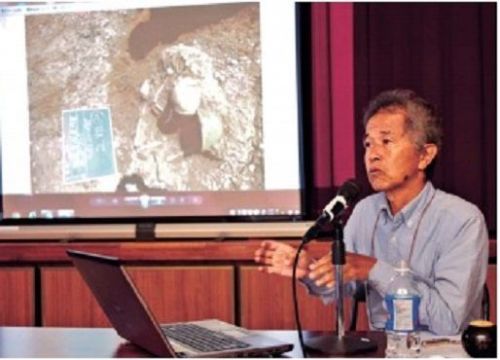War remains recovery volunteer touts importance of keeping Battle of Okinawa lessons alive

Takamatsu Gushiken explaining remains recovery while showing photographs at Asato Catholic Church on September 24.
September 25, 2017 Ryukyu Shimpo
On September 24, representative Takamatsu Gushiken of the Gamafuya, a volunteer group dedicated to the recovery of Battle of Okinawa remains, held a lecture at Asato Catholic Church in Asato, Naha City. About 60 people attended the lecture, during which Gushiken explained that remains recovery is significant because it can teach people about the succession of the Battle of Okinawa.
He said: “When children see the bones with their own eyes, they can feel the reality that this was a battle site.
It makes them question, ‘Why did these people have to be killed?’”
Back in 2009, he displayed some photographs of remains recovery in Makabi, Naha City, while explaining that, “human bones fell apart as they were brought out [of the ground].
” He said he felt the true ferocity of the battle from studying the damaged remains of the Japanese and American soldiers.
At that time, Gushiken pointed out that as post-war residents of the area had begun their own efforts to recover war remains, it was becoming important to convey the significance of the Battle of Okinawa.
He said to local elementary school pupils attending for peace studies: “When you have seen the bones, you can say that Makabi was a battle site.
Why did such a thing occur? Think, when you grow up, could such a terrible thing happen again?”
At his lecture at the Asato Catholic Church, Gushiken touched on the recent incident of young men damaging the Chibichiri Gama cave in Namihira, Yomitan Village.
The young men said they went to the shinrei spot (haunted location) to test their courage.
Gushiken said that upon hearing about this he felt frustration that he was not able to pass on the lessons of the Battle of Okinawa to younger generations.
He said, “We must all, myself included, revisit the way in which we show our respect and remembrance for the war dead.”
Furthermore, Gushiken mentioned something he had come to realize through remains recovery.
He came to recognize that killing, deeming killing acceptable, and killing oneself are all wrong; the Battle of Okinawa forced these actions.
(English translation by T&CT and Erin Jones)
Previous Article:Ex-Pro soccer player José Edmílson visits Okinawa to teach Brazilian soccer
Next Article:All-time monthly record of more than one million tourists visited Okinawa this August
[Similar Articles]
- Dozens of bones found in planned dirt excavation site in Komesu, Itoman, says Okinawa prefecture and war-dead remains recovery group
- Volunteers recovering the remains of Battle of Okinawa victims press government to re-assess the landfill application for new base at Henoko
- Three remains from the Battle of Okinawa found in Nishihara
- DNA testing identifies Japanese soldier killed in Battle of Okinawa
- Volunteer group Gamafuya asks the OPG to stop cremating remains of the Battle of Okinawa
 Webcam(Kokusai Street)
Webcam(Kokusai Street)


